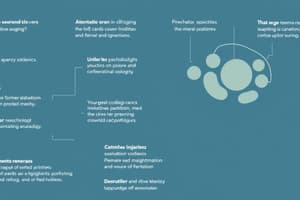Podcast
Questions and Answers
What is a significant disadvantage of using surveys?
What is a significant disadvantage of using surveys?
- They may not yield valid insights due to potential bias in responses. (correct)
- Surveys often require extensive resources to conduct.
- They are typically expensive and inefficient for collecting data.
- Surveys are not effective for gathering data from diverse populations.
Which statement accurately reflects an advantage of standardized tests?
Which statement accurately reflects an advantage of standardized tests?
- They eliminate biases completely in psychological assessment.
- They can provide insight only into academic achievements.
- They can yield reliable measures when constructed properly. (correct)
- They require no construction, making them easy to implement.
What is a limitation of correlational studies?
What is a limitation of correlational studies?
- They require extensive manipulation of variables.
- They usually rely on small sample sizes for reliable data.
- They do not permit identification of cause and effect. (correct)
- They can identify cause and effect with high precision.
What is a potential disadvantage of conducting experiments?
What is a potential disadvantage of conducting experiments?
Which of the following is NOT an advantage of experiments?
Which of the following is NOT an advantage of experiments?
What is a primary disadvantage of using case history as a research method?
What is a primary disadvantage of using case history as a research method?
Which of the following best describes an advantage of naturalistic observation?
Which of the following best describes an advantage of naturalistic observation?
Why is laboratory observation considered to have limited generalizability?
Why is laboratory observation considered to have limited generalizability?
What role do research methods play in psychology?
What role do research methods play in psychology?
How does case history facilitate research?
How does case history facilitate research?
What is a disadvantage of naturalistic observation?
What is a disadvantage of naturalistic observation?
Why might a psychologist choose laboratory observation over other methods?
Why might a psychologist choose laboratory observation over other methods?
What is a key strength of case history research in psychology?
What is a key strength of case history research in psychology?
Flashcards
Surveys
Surveys
A research method used to collect data from many individuals, often by asking questions through questionnaires.
Correlational Study
Correlational Study
A type of study that examines the relationship between two or more variables, but does not prove a cause and effect.
Experiments
Experiments
A research method where the experimenter controls certain variables to test how they affect other variables.
Tests
Tests
Signup and view all the flashcards
Experiments
Experiments
Signup and view all the flashcards
Research Methods in Psychology
Research Methods in Psychology
Signup and view all the flashcards
Research Methods
Research Methods
Signup and view all the flashcards
Case History
Case History
Signup and view all the flashcards
Naturalistic Observation
Naturalistic Observation
Signup and view all the flashcards
Laboratory Observation
Laboratory Observation
Signup and view all the flashcards
Ecological Validity
Ecological Validity
Signup and view all the flashcards
Confounding Variables
Confounding Variables
Signup and view all the flashcards
Reliability
Reliability
Signup and view all the flashcards
Study Notes
Research Methods in Psychology
- Research methods are crucial for understanding human behavior and mental processes. They offer structured ways to collect and analyze data, leading to discoveries and conclusions. Different methods have varying strengths and weaknesses, affecting the reliability and validity of findings.
Importance of Research Methods
- Research methods help form hypotheses and test theories.
- They enable psychologists to examine complex phenomena beyond casual observation.
- Understanding the advantages and disadvantages of each method is key for selecting the right approach for research questions.
Case History
- Advantages: Valuable for hypothesis generation, providing insight into individual cases, which can lead to broader theories. Provides detailed information on individuals, enabling a deeper understanding of specific psychological phenomena. Acts as real-world experiments, exploring ethical or impractical situations inaccessible via traditional methods.
- Disadvantages: Individual cases may not represent the wider population, limiting generalizability. Subjective interpretations can affect the accuracy of conclusions.
Naturalistic Observation
- Advantages: Describes behavior in natural settings, offering ecological validity. Useful in early research stages to generate hypotheses and identify variables.
- Disadvantages: Researchers have limited control over the situation, potentially introducing confounding variables. Observations can be biased by the observer's perspective, compromising data reliability. Cannot establish cause-and-effect relationships.
Laboratory Observation
- Advantages: Greater control over variables than naturalistic observation, allowing for precise measurements. Enables sophisticated equipment use, enhancing research quality.
- Disadvantages: Limited control over situations can lead to biases in observations. Results may lack generalizability to real-world scenarios due to the artificial lab environment.
Survey and Testing Methods
- Surveys: Gather extensive information from large populations, easily identifying trends. Cost-effective for collecting data from many people.
- Disadvantages: Non-representative or biased samples can lead to inaccurate generalisations. Responses might be inaccurate or untruthful, affecting findings' accuracy.
- Tests: Provide valuable insights into personality traits, emotions, aptitudes, and abilities, aiding psychological assessment. Standardised tests can yield reliable measures if well-constructed.
- Disadvantages: Constructing valid and reliable tests is challenging, leading to potential inaccuracies. Cultural and contextual factors can affect test results, complicating interpretation.
Correlational Studies and Experiments
- Correlational Studies: Identify relationships between variables, revealing potential connections. Guide further research, highlighting areas for experimental investigation.
- Disadvantages: Cannot establish cause-and-effect relationships, limiting the conclusions that can be drawn.
- Experiments: Allow researchers to manage situations and manipulate variables, leading to clearer cause-and-effect conclusions. Designed to minimise biases and confounding variables, increasing result reliability.
- Disadvantages: Artificial experimental settings sometimes fail to generalise to the real world. Experimenter effects, where researcher expectations impact outcomes, can occur.
Studying That Suits You
Use AI to generate personalized quizzes and flashcards to suit your learning preferences.




